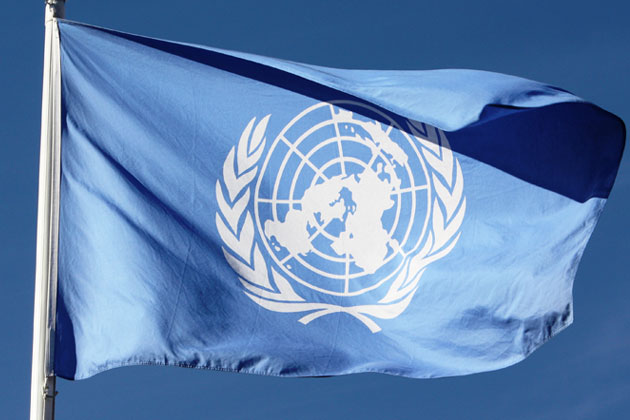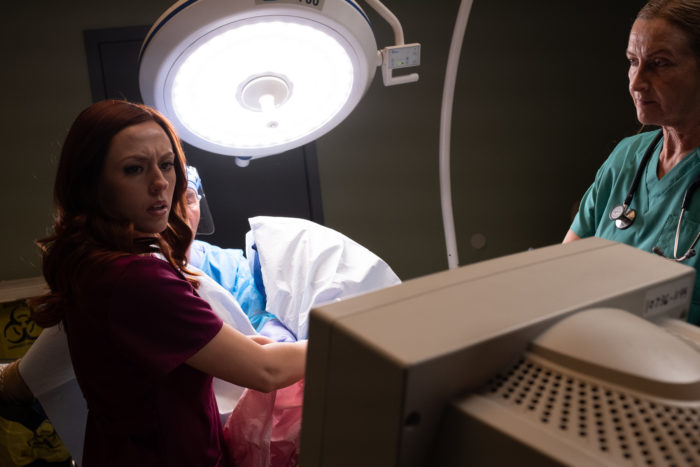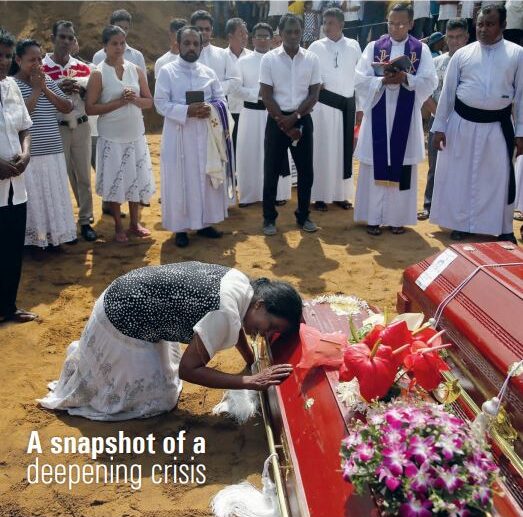
The famous University Church of St John Henry Newman has been vandalised.
On Wednesday morning graffiti was discovered on the main doors of the church in Stephen’s Green Dublin, with vandals having spray painted the word ‘Danger’ upon them along with an arrow pointing inside.
The church was designed and built by St Newman himself when he founded the Catholic University that would later become University College Dublin.

Former New Zealand Prime Minister Sir Bill English and his wife Mary have painted a graphic picture of abortion during a plea to law makers to not make extreme changes to abortion laws.
He criticised many of the proposed changes at a select committee hearing on Wednesday but also launched into a fierce defence of the right of medical professionals to conscientiously object to carrying out abortions if the changes were made.
“It will be legal to kill that child in the birth canal and the way they do that, if the abortion doesn’t work, is that they put a pin through the base of the skull into the brain,” he said,
“It is extreme violence that’s what it is, that’s the act.”
His wife Mary, a doctor, told the committee there could be a greater number of “gruesome” abortions after the legislation was passed.
“[These] require a lethal injection to an otherwise very alive unborn baby before inducing full labour so as to deliver a dead baby.”
The legislation would also require health care professionals who object to performing abortions to refer women to the Ministry of Health to obtain one.
Mr English said proposed rules around doctors who conscientiously object to abortions are “abhorrent”, “disgraceful” and “unfair”.

The United States told the U.N. Security Council on Tuesday that it opposed references to sexual and reproductive health and to “safe” abortions, pitting Washington against Britain, France and many other Western Nations.
While the United States joined its 14 council counterparts to unanimously adopt a resolution on women, peace and security, U.S. Ambassador Kelly Craft raised objections to parts of the text: “We cannot accept references to ‘sexual and reproductive health,’ nor any references to ‘safe termination of pregnancy’ or language that would promote abortion or suggest a right to abortion,” she said after the vote.
“The U.N. should not put itself in a position of promoting or suggesting a right to abortion, whether it is humanitarian or development work,” said Craft, who took up her role in August.

Scottish officials have drawn up a “baffling” list of 21 sexualities for Scots to choose from in the 2021 census.
Civil servants said terms including skoliosexual, gynephilic and demiromantic will be understood.
However, the census chiefs faced ridicule after putting forward such a wide array of sexuality choices and Edinburgh University’s Dr Kath Murray said the huge list could “blur” data.
National Records of Scotland revealed in a letter to MSPs they planned to expand the four basic categories initially proposed — straight or heterosexual, gay or lesbian, bisexual and other.
The 21 “other” options for census respondents are mooted as androphilic, androsexual, asexual, bicurious, bisexual, demiromantic, demisexual, fluid, gay, gynephilic, gynesexual, homosexual, heterosexual, lesbian, pansexual, polysexual, queer, questioning, skoliosexual, straight and unsure.
Mocking the descriptions, a Tory spokesman said: “Most Scots will think it’s ridiculous to have 21 options under this question, when ‘other’ would have taken care of the vast majority. Clearly the general public wouldn’t even know where to begin with some of these descriptions. People will be baffled.”

A Government scheme to provide contraception free of charge could cost €100m and might not work, according to a new report.
The report of a working group, set up earlier this year by Health Minister Simon Harris in the wake of the liberalisation of abortion laws, said the notion there is a “sizeable” affordability challenge across the population in terms of accessing contraception remains unproven.
Simply making contraception free for users would not necessarily reduce the number of crisis pregnancies or help promote the uptake of more effective contraceptive methods, the group warns. There is a “very real risk” that removing the cost barrier would simply displace private expenditure and represent an “ineffective use of scarce resources” without actually modifying behaviour or improving health benefits, it notes.
Nonetheless, even a “relatively marginal improvement in access and contraception use” would have some health advantages in terms of avoiding the negative consequences of crisis pregnancies, it argues.
The working group also found contraception use in Ireland is “high and stable” and difficulty accessing contraception is a challenge only “at the margins in overall population terms”.

Ashley Bratcher, lead actress in the pro-life movie ‘Unplanned’, will be the keynote speaker at the Pro Life Campaign’s National Conference this weekend.
The conference will be held in the RDS, Dublin, this Saturday from 1 to 4:30pm and is free to all. The public have shown almost unprecedented interest with over 800 participants already registered. Unplanned has been showing in Irish cinemas in recent weeks.
The movie Unplanned told the true story of one woman’s journey from managing an abortion clinic to becoming one of America’s most effective pro-life voices.
Eilis Mulroy of the pro-Life Campaign said Unplanned is changing hearts and minds and getting people thinking. “We are thrilled that Ashley Bratcher will be the keynote speaker at our conference in the RDS on Saturday. There will also be a special screening of the movie at the conference with Ashley present,” she said.
“And there will be a Q&A session after the screening where attendees will have the opportunity to hear about Ashley’s own very personal story related to the abortion issue. ‘Unplanned’ addresses a side of the abortion debate that people certainly need to hear given all the changes that have recently taken place in Ireland regarding the issue.”

A Dundalk Church had a lucky escape last week when a priest extinguished a fire set by arsonists.
According to a report in the Dundalk Democrat, a pot at the front door of Holy Redeemer church was set alight at 10:45pm last Wednesday.
Luckily however, a local priest spotted the blaze and extinguished it before it enveloped the church
Nonetheless, some damage was done to the front door, the walls and the overhanging roof.

A priest in a South Carolina church has caused ripples by denying communion to the leading contender for the Democratic presidential nomination.
Former Vice-president and lifelong Catholic, Joe Biden, was campaigning in South Carolina on Sunday, and attended 9am mass at St. Anthony’s Church in Florence.
However, parish priest Fr. Robert Morey denied him communion because of his public support for abortion rights.
Fr Morey, who was a lawyer for 14 years before becoming a priest, said Holy Communion “signifies we are one with God, each other and the Church”.
“Our actions should reflect that. Any public figure who advocates for abortion places himself or herself outside of Church teaching,” the priest added.

While Christians in Iraq and Syria suffer in the aftermath of Islamic State genocide, a new “hot spot” of persecution has emerged in South and East Asia, a recent report finds.
“The situation for Christians has deteriorated most in South and East Asia: this is now the regional hot spot for persecution, taking over that dubious honour from the Middle East,” stated a report on global Christian persecution by the group Aid to the Church in Need, a pontifical foundation that provides relief to Christians in 140 countries, including Ireland.
ACN released its biennial study of the global persecution of Christians last week. The 2019 report “Persecuted and Forgotten?” compiled information on acts of harassment, violence, and discrimination committed against Christians over the span of 25 months from July 2017 through July 2019; details on the persecution were gathered by ACN on fact-finding trips.
One of the report’s chief conclusions was that of all persecuted Christians, “Christian women suffer the most, with reports of abductions, forced conversions and sex attacks.”
The report focused on 12 countries where Christian persecution was most severe: Iraq, Egypt, Nigeria, Central African Republic, Sudan, India, Pakistan, Burma, Sri Lanka, China, the Philippines, and North Korea.

The opening of a new community school in a busy commuter belt area of Co Meath has been deferred because it did not enrol any pupils.
The Department of Education fast-tracked the construction of Dunshaughlin Community National School, run by the Education Training Board, earlier this year based on its demographic projections which indicated there was an urgent need for a new school.
However, the eight-classroom school did not open in September as planned, due to a lack of enrolments.
A teacher who was hired has since been redeployed, while a new school principal is processing enrolments for the coming year.
It was one of 42 new schools announced by the Government which are being built between now and 2022.